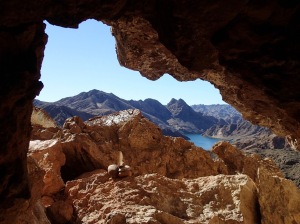Note: Like Cave Legends #2, which was a variation of the original legend of Timpanogos Cave, this tale has many versions. Legends like these grow and evolve as they are passed down through history. The following is a historical but fictional account of the last renegade Indian.
Queho was born in a small reservation consisting of three different tribes near Las Vegas Nevada in 1880. He was born with a clubfoot and was the son of a Paiute man who abandoned the boy and a Cocopa woman who died shortly after childbirth. Queho’s uncle on his mother’s side raised him begrudgingly. The uncle beat him occasionally and, when he grew older, would only let him stay if he worked and forked up most of his earnings. He was ridiculed and shamed by the tribes because of his mixed birth and his limp.
Queho began work farming and gathering wood off the reservation on nearby ranches and local mining camps. He stayed to himself when on the reservation, attempting to hide from the tribes, for none had taken him in or shown him any kindness. When not at work, he went on long excursions into the wilderness. It was all he could do to stay away from his tormentors. Boys his age, older, and younger than he, would throw rocks at him and call him mean names. They insulted his mother and called him a bastard, a half-breed, a gimp.
Eventually, Queho was able to afford his own tent, and he moved out of his uncle’s tiny house. He continued to work at the mining camp but began avoiding the reservation as much as possible. After saving up a bit of money for himself, he decided to buy a bottle of whiskey and go to the reservation to share it with his uncle. His uncle turned him away at the door, telling Queho that he hated him for abandoning him and that he was no longer family.
On his way out of the reservation, he was attacked by younger boys from the Paiute tribe. They threw rocks at him for several minutes, and one struck him in the forehead, sending warm tendrils of blood into his eyes. After wiping away the blood, Queho was able to hobble away. He went back to his tent and began to cry. He was tired of being an outcast. He decided that night that if the world didn’t love him, he would show no love back to the world. The next day, he took what was left of his savings, went into town and purchased a five-shot cartridge revolver and a wooden-handled axe.
Queho waited until deep into the night, then took his weapons and headed to the reservation. He saw a young Paiute Indian leaving camp to relieve himself on a nearby tree. He moved quickly and quietly, coming upon the young man from behind, and with one mighty blow, Queho buried the blade side of the axe halfway down into the Paiute’s skull. The body slumped to the ground immediately, and Queho began the struggle of retrieving the axe, which was stuck in the young Indian’s head. He decided to drag the body further away from the camp so as not to be caught by other tribesmen. A few miles into the woods, he stopped and used the leverage of a nearby tree to dislodge his axe from his victim’s cranium. He then cut off his braid and kept it for a trophy.
Queho moved his tent further away from the reservation in case people came looking for him, but no one came. Running out of money and food, Queho came back to the reservation one night to take what he could find. Two large Cocopa males were up late, drinking and laughing on the porch of a small house. He approached in the shadows but his limp drew their attention. “Queho, where have you been? We thought you had died. Come share a drink with us,” said the larger of the two men, one named Harry Bismark.
Queho was taken aback. He had never been offered a drink by any of his tribesmen. He was half Cocopa, or so he had been told, and he had always wanted to be accepted by his tribe, but only his Cocopa uncle had ever been even remotely kind to him. Queho smiled and approached the men cautiously. Harry passed him the bottle and he took a deep pull from the spirits. It burned as he swallowed the warm liquor. Holding back a cough, he cleared his throat, thanked Henry, and passed the bottle to his friend on the left, whose name Queho couldn’t recall.
Henry then asked Queho if he was hungry. He had not eaten in days and shook his head yes intensely. Henry laughed a hearty laugh, grabbed a wing off of a roasted chicken, threw it in the dirt, and said, “Half-breeds eat what true-bloods throw away. There, have your share.” Queho’s anger took over his hands, which drew the revolver instantly. He emptied three rounds into Henry’s chest, turned, and took the top of the other Cocopa’s head off with a single shot. He quickly packaged up the remaining meat and pillaged the two Indians’ pockets. As he rolled Henry over to grab his wallet, Henry belched and with fading force, whispered, “Bastard.”
Queho put the revolver into Henry’s mouth and fired his final shot through the top of the old Indian’s head. He jumped onto Henry’s horse and took off before anyone else could get to the house to see what all the gunshots were about. He knew that he could never go back to the reservation. He knew that he would soon be considered a murderer and an outlaw to his people. He was at peace with his decisions. He was tired of being picked on. From now on, he would be feared.



